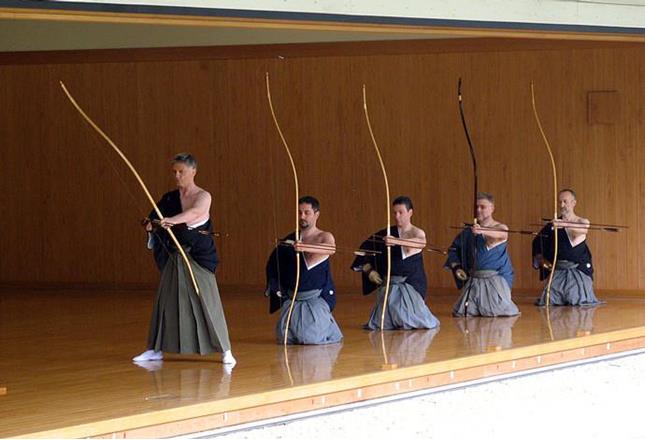
Mike Cundy, experienced instructor and member of the United Kingdom Kyudo Association, tells us more about this unique form of archery.
What is Kyudo?
Kyudo, which literally means “The Way of the Bow”, is traditional Japanese archery. The equipment and style of shooting was developed over a thousand years ago and has changed very little through to the present day.
As well as being a martial art, it plays an important part in the ceremonial, religious and cultural life of Japan where it is seen as a method of training the mind and developing character.
First introduced to the outside world through the writing of the German philosopher Eugen Herrigel, it is now practised by enthusiasts around the world.
How does it work?
Kyudo is conducted in a formal atmosphere following traditional Japanese methods and procedures. All practice is supervised and under the guidance of a qualified instructor. It cannot be self-taught and a commitment to regular training is important.
What are the main benefits of participating in the sport?
Kyudo is a very good way of developing and maintaining good posture and general physical good health but it is most beneficial in terms of developing self-awareness and mental wellbeing, concentration and determination.
Can anyone participate in the sport?
Kyudo is an inclusive activity and nobody is turned away on disability grounds. Equally there is no gender differentiation - men and women practise and compete on equal terms. Having the right positive attitude is by far the most important requirement.
Where can I go to get involved?
There is a network of registered Dojos (a martial arts training place) across the UK. The development process is monitored and administered under the auspices of the United Kingdom Kyudo Association to ensure the authenticity of the practice.
If you want to get involved please contact your nearest Dojo and ask to attend and observe a practice. Contact details and all registered Dojos are listed on the UKKA website.
Can I take it to a professional level?
Kyudo is an amateur activity at all levels. There is no professional status and there are no charges for instruction. Most Dojos will charge a small fee to pay for premises and they will also have equipment for beginners but students will need to acquire their own as they make progress.
Costs are more or less equivalent to western archery but students are advised not to buy anything without the advice of their instructor. The selection of the right equipment requires experience and an understanding of individual needs.
This afternoon, the Chancellor delivered her Budget speech to Parliament, outlining decisions on tax and spending.
Read moreAhead of the Chancellor’s Budget statement on 26 November, we take a look a look at the key areas to be aware of and the work the Alliance has been doing lobbying on behalf of members.
Read moreGovernment has today formally launched a consultation on reforming the role of statutory consultees in the planning system. The consultation runs for eight weeks, closing on 13 January 2026.
Read moreJoining the Sport and Recreation Alliance is pretty simple, but worthwhile!
Register now